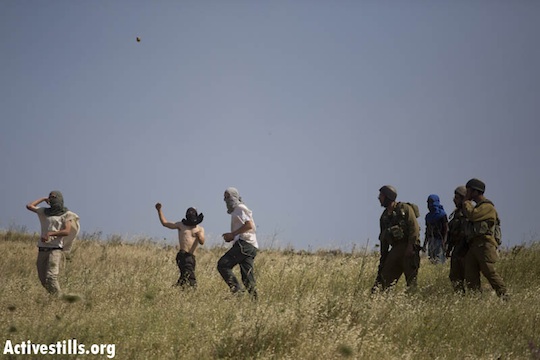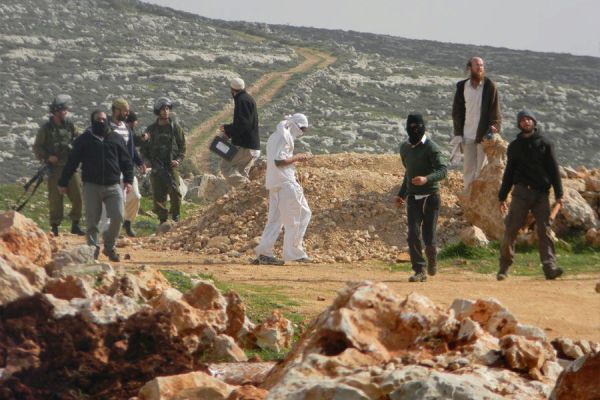The IDF has all but refused to fulfill its obligation to hold Israeli settlers accountable under the law and to protect Palestinians from them.
By Eyal Hareuveni

For nearly 50 years the Israeli army has been treating settler violence against Palestinians as a decree of fate, some sort of force majeure that trumps it in the territories otherwise under its control and responsibility. In other words, the army has dealt with the phenomenon without actually dealing with it.
International law, however, is quite clear that the occupying power, the Israeli army in this case, has an obligation to preserve the rule of law and public order in those territories. In countless rulings, the Israeli High Court has even emphasized that it is a basic and fundamental obligation — but the IDF paid no heed.
Yesh Din published a new report this month, “Standing Idly By,” documenting the phenomenon of Israeli soldiers doing just that in the face of offenses by Israeli citizens against Palestinians in the West Bank. The report highlights how soldiers don’t detain or arrest Israelis involved in violent incidents, how they don’t secure crime scenes so that evidence can be collected, how they don’t document such incidents and how they don’t file complaints with the police. Numerous government-sanctioned and human rights NGO reports have addressed this phenomenon since the early 1980s, and yet, for some reason, the IDF has not eradicated it.
Read the full report: ‘Standing Idly By‘
In 2004, in response to an ACRI High Court petition demanding that the army protect Palestinian farmers in the olive harvest, the IDF was forced to answer for its refusal to fulfil its obligations to enforce the law and maintain public order. Then, too, the army tried to pass on its responsibility to the police. The High Court justices weren’t convinced by the army’s arguments. They expressed serious criticism of its “helplessness” and “oversights” in enforcing the law; the justices ordered the army to “immediately correct its distortions.”
However, the army once again dragged its feet. Only in 2009, three years after the ruling on the olive harvest, did the army’s legal advisor for the territories send — for the first time — a fact sheet to commanders clarifying soldiers’ obligation to intervene in crimes committed by Israelis. In 2013, four years after that, the state comptroller found that army’s Central Command had not made any efforts to implement the High Court ruling or the legal advisor’s memo to commanders: soldiers were not trained to fulfil their role in enforcing the law; the very concept of law enforcement wasn’t mentioned in general orders; senior officers testified about the army’s failure to fulfil its obligatory role.

Only in the summer of 2014 did the Central Command enact the procedures for law enforcement against Israeli citizens published by the attorney general in 1998, eight years after the High Court decision. And yet, soldiers still do not know what obligations and authorities they have as law enforcement officers. They still do not act to prevent harm to Palestinians or to ensure that criminals are brought to justice. Dozens of testimonies collected by Breaking the Silence indicate that the prevailing command culture in the army is to not deal with settlers. In one such testimony, an enlisted soldier in the Artillery Corps summarized what he believed he was authorized to do when faced with Israeli law-breakers: “Nothing. Nothing. Nothing. Nothing. Absolutely nothing.”
The phenomenon of soldiers standing idly by demonstrates one aspect of the colossal failure of the rule of law in the West Bank. According to Yesh Din data, in the rare cases when Palestinians do file police complaints about crimes committed by Israeli citizens, and when police actually open an investigation, the chance of an indictment results in a conviction is a mere 1.9 percent.
Back in 1983, the Israeli-government sanctioned Karp Commission already described the justice system, army and police’s failure to enforce the rule of law in the occupied territories as a vicious cycle. In order to break out of that unjust cycle the army must establish clear orders that clearly detail soldiers’ obligations when encountering crimes committed by Israelis against Palestinians. It must also codify standing idly by as a crime in the military’s criminal code.
The author is a researcher for Yesh Din – Volunteers for Human Rights and the author of the report, ‘Standing Idly By.’

